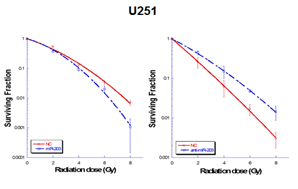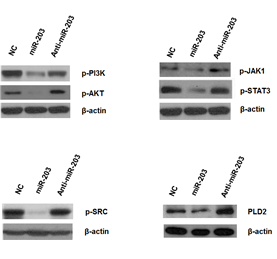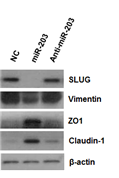글로벌 연구동향
방사선생물학
![[Int J Radiat Oncol Biol Phys] MicroRNA-203 Modulates the Radiation Sensitivity of Human Malignant Glioma Cells.](/enewspaper/upimages/admin_20160317181212_R.jpg) 2016년 03월호
2016년 03월호
[Int J Radiat Oncol Biol Phys] MicroRNA-203 Modulates the Radiation Sensitivity of Human Malignant Glioma Cells.서울대/장지현, 김인아*
- 출처
- Int J Radiat Oncol Biol Phys.
- 등재일
- 2016 Feb 1
- 저널이슈번호
- 94(2):412-20.
- 내용

그림 1. miR-203을 transfection 시킨 U251 cell line에서 방사선조사시 surviving fraction 이 유의하게 감소하였다.
그림 2. Western blot 결과 homologous recombination 에 관여하는 ATM 과 RAD51 의 발현이 miR-203을 transfection 시킨 U251에서 감소하였다.
그림 3. miR-203 의 과발현은 U251 cell line에서 p-PI3K, p-AKT, p-JAK1, p-STAT3, p-SRC, PLD2 의 발현을 감소시켰다.
그림 4. EMT 관련 단백질변화
miR-203 의 과발현으로 epithelial marker 는 증가하고 mesenchymal marker 는 감소하였다.
Abstract
PURPOSE:
We investigated whether miR-203 could modulate the radiation sensitivity of glioblastoma (GBM) cells and which target gene(s) could be involved.
METHODS AND MATERIALS:
Three human malignant glioma (MG) cell lines and normal human astrocytes were transfected with control microRNA, pre-miR-203, or antisense miR-203. Real-time PCR (RT-PCR), clonogenic assays, immunofluorescence, and invasion/migration assays were performed. To predict the target(s), bioinformatics analyses using microRNA target databases were performed.
RESULTS:
Overexpression of miR-203 increased the radiation sensitivity of all 3 human MG cell lines and prolonged radiation-induced γ-H2AX foci formation. Bioinformatics analyses suggested that miR-203 could be involved in post-transcriptional control of DNA repair, PI3K/AKT, SRC, and JAK/STAT3 and the vascular signaling pathway. Western blot analysis validated the fact that miR-203 downregulated ATM, RAD51, SRC, PLD2, PI3K-AKT, JAK-STAT3, VEGF, HIF-1α, and MMP2. Overexpression of miR-203 inhibited invasion and migration potentials, downregulated SLUG and Vimentin, and upregulated Claudin-1 and ZO1.
CONCLUSIONS:
These data demonstrate that miR-203 potentially controls DNA damage repair via the PI3K/AKT and JAK/STAT3 pathways and may collectively contribute to the modulation of radiation sensitivity in MG cells by inhibiting DNA damage repair, prosurvival signaling, and epithelium-mesenchyme transition. Taken together, these findings demonstrate that miR-203 could be a target for overcoming the radiation resistance of GBM.
Author information
Chang JH1, Hwang YH2, Lee DJ2, Kim DH2, Park JM2, Wu HG1, Kim IA3.
1Department of Radiation Oncology, Graduate School of Medicine, Seoul National University, Seoul, Republic of Korea.
2Medical Science Research Institute, Seoul National University Bundang Hospital, Kyeonggido, Republic of Korea.
3Department of Radiation Oncology, Graduate School of Medicine, Seoul National University, Seoul, Republic of Korea; Medical Science Research Institute, Seoul National University Bundang Hospital, Kyeonggido, Republic of Korea; Cancer Research Institute, Seoul National University, Seoul, Republic of Korea. Electronic address: inah228@snu.ac.kr.
- 연구소개
- 악성뇌교종은 다양한 병합치료에도 불구하고 예후가 불량하며 방사선에 대한 저항성이 이러한 치료저항성의 주요한 기제로 알려져 있습니다. 본 연구에서는 miR-203이 malignant glioma cell line에서 radiosensitivity에 관여하는 것을 처음으로 밝혔고, 이에 관여할 것으로 예측되는 다양한 target pathway 와 관련 gene 들을 생물정보학기술을 통해 발굴하여 western blot 으로 검증하였습니다. 또한, miR-203의 epitelial-mesenchymal transition 및 종양미세환경에 대한 영향도 확인하였습니다. 다양한 pathway alteration을 보이는 악성뇌교종 환자에서 microRNA-203 와 같이 multiple pathway에 동시에 작용하여 방사선감작효과를 나타내는 표적이 적절한 전달기술을 통해 상용화 된다면 실제적으로 임상에 기여할 수 있을 것으로 기대합니다.
- 덧글달기







